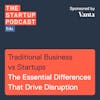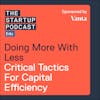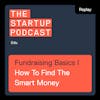Edu: Knowledge vs Wisdom - When Our Advice Is WRONG!
Rules are meant to be broken! You wouldn’t be building startups if you were a complete rule follower.
In this episode, Chris Saad and Yaniv Bernstein discuss all the times when you should IGNORE their advice!
Together they cover common themes that regularly appear in episodes:
Don’t listen to VCs
Don’t compromise on your vision
Don’t build B2B when you’re trying to build B2C
Don’t build a technology-backed services company
Along the way they also sprinkle key insights such as “data in context is information. Information in context is knowledge. Knowledge in context is wisdom”.
Whether this is your first time listening to The Startup Podcast, or you’ve held with baited breath week-to-week for the next episode from the beginning, learning when to break the rules is almost as important as learning the rules.
Enjoy!
Episode Links
Listen to episode 2- Edu: Early Ideation - Your Idea is Worthless: https://www.tsp.show/edu-early-ideation-your-idea-is-worthless/
Listen to the episode featuring Kyle Poyar, Accelerate Sales with Product Led Growth: https://www.tsp.show/guest-kyle-poyar-accelerate-sales-with-product-led-growth/
The Pact
Honour The Startup Podcast Pact! If you have listened to TSP and gotten value from it, please:
Follow, rate, and review us in your listening app
Follow us on YouTube
Give us a public shout-out on LinkedIn or anywhere you have a social media following
Key links
Follow us on YouTube for full-video episodes: https://www.youtube.com/channel/UCNjm1MTdjysRRV07fSf0yGg
Get your question in for our next Q&A episode: https://forms.gle/NZzgNWVLiFmwvFA2A
The Startup Podcast website: https://tsp.show
Learn more about Chris and Yaniv
Work 1:1 with Chris: http://chrissaad.com/advisory/
Follow Chris on Linkedin: https://www.linkedin.com/in/chrissaad/
Follow Yaniv on Linkedin: https://www.linkedin.com/in/ybernstein/
Yaniv: When we talk about dumb money, we're talking about a class of investor, not investors, writ large. I think there are some very, very smart investors out there.
And if you're hearing the same thing from all of them, listen consider why you are hearing that thing and consider whether there is some very valuable knowledge, that you should really be taking on board if you ever wanna succeed.
Hey, I'm Yaniv,
Chris: And I'm Chris.
Yaniv: And in today's episode we're going to do something fun. Chris and I are pretty opinionated people. You may have noticed that, and we often say that there are certain things that you should or shouldn't do when building your startup. And most of the time we like to think we're right.
But there are exceptions to every rule.
Today we're going to talk about all the times when you should ignore our advice.
Chris: That's right. Yaniv, we often get feedback from founders who are doing a certain thing or have just heard an episode and they're like, but what about in this circumstance? Or what about in that circumstance? Or, you gave me the opposite advice to now one-on-one advisory and like, why are you saying this other thing over here?
And the answer is often because, It depends, there's a wonderful saying, which is data in context is information. And information in context is knowledge. And I like to add to that, which is knowledge in context is wisdom. And so what we wanna do is give you this knowledge with a little bit more context and add to the wisdom out there.
So we're gonna cover some of our very, Common topics. like, don't listen to VCs. Don't compromise your vision. don't build B2B when you're trying to build b2c. don't build a technology backed services company. We want to go through these and we want to break down when that advice is wrong or wrongly interpreted by the audience, based on some of the feedback we've gotten. So let's dive into it. Yev.
Yaniv: So the first thing we've got here is don't listen to VCs. Now this is a bit of a strawman. We never quite said. Don't listen to VCs, but what we have done, Chris, is caution people against taking the advice or feedback from a particular venture capitalist or whatnot too seriously, or taking it too much to heart.
What can happen is, you go in, you pitch to a VC and they say, oh, you shouldn't do this. You should do that, or You should monetize this thing before we're interested in investing. And then, the founder can go away and ends up. Compromising on what they think is right because of what the VC has said.
And we've said, don't do that. That's not a good idea. but the thing here isn't to say, don't listen to VCs, Chris, but I think it's more we would like you to consider how you listen to VCs and what lessons you take from listening to VCs.
Chris: I just got off a call with a founder I was working with and had to remind him that VCs and the VCs on his board are not omniscient, omnipotent, objective operators in the world, right? they have opinions, and opinions are worth what they're worth.
There are different kinds of VCs with different kinds of incentives and different kinds of markets who are acting on different kinds of information, who have their own particular thesis about the market. you need to take their advice with a grain and salt. And preserve and protect your vision or the problem you're trying to solve. But I think the, clearest example of where this advice is wrong, this advice of like being cautious about VC input, is around this idea of like, well, I have a big vision.
And I have an incredible idea of where this is all gonna go and this VC just doesn't get it. Chris and Yev said, I shouldn't listen to VCs cuz they don't know what they're talking about. And they each have their own perspectives and, well, I bloody well know something, these guys don't, and I'm gonna prove them wrong.
And so I'm gonna continue along my journey of boiling the ocean. And this is I think Yaniv have the clearest example where our advice can be taken. Poorly or taken in the wrong way, the VCs are right when they say to you. What is the problem you're solving? What is the actual pain in the world where you are the number one, two or three thing that some company has to go buy?
Or what is your demonstrated execution to towards solving that problem? it's not enough to just say, I have a big vision and I'm gonna prove them wrong. You have to show to them how you are. Uniquely qualified to connect that big vision to pragmatic, tactical, commercial execution.
And so they're not wrong when they say to you, well, that's a great big idea, Chris, but I don't see how you're gonna get from here to there. What they're saying to you is, I don't believe that you are the guy to do this. You have not demonstrated that that big vision. Is achievable by you, you personally, cuz you have not demonstrated any efficacy in building a business that solves a problem for anyone or shown any kind of roadmap.
You know, pre-product if you're raising off just the deck shown any plan to get from here to there that is pragmatic or realistic. And so you absolutely need to hear that kind of feedback from investors and from advisors. And you can't just dismiss it as just they don't get it.
Yaniv: Absolutely. So I think there were a few things there and first of all, we had a few inspirations for this episode. One of them was LinkedIn place that I wrote about the difference between. In being idealistic. Which I think is good and being naive, which I think is bad, the idealistic person has a big vision but is very much aware of all the challenges and dangers and the hostilities that they'll face, in executing against that vision.
And so they are vigilant and they are determined to overcome those obstacles, whereas, Someone who's naive, kind of just thinks that they've got a big vision, a big dream, and that should be enough, right? That the world kind of owes them something, and that all those challenges that are very real, that they can just magically wish them away.
And when I see founders who are naive, it makes me sad because they can have. There's huge amount of energy and life force and a, grand dream that they're putting into their startup. But you know, they're not going to succeed and they're not going to succeed because they don't have a clear view of the reality, of the, hostile reality that they're facing.
And the thing to understand with the startup is we talk about making a dent in the world about creating a new reality. Well, guess what? Reality rejects change, right? it's like a body rejecting an organ. it has an immune system. Reality doesn't just go like, oh, you wanna change me?
Like, great. here you go. No, you've gotta fight to change reality. have to understand the way in which the world is constructed, if you wanna have any hope of changing it. And I think quite often, naive founders are simply blind to all the challenges that they're going to face. and that is really problematic.
And so when, I talk about how does that fit into VCs, You get rejected by one vc. That's a dot. if you speak to a variety of excellent VCs and you are hearing the same message over and over again about why they're concerned about your vision, it doesn't mean that they're right, start connecting those dots.
Seek out the common patterns and think to yourself, these are smart people, right? I have never been an advocate for saying, you know, VCs are dumb. And when we talk about dumb money, we're talking about a class of investor, not investors, writ large. I think there are some very, very smart investors out there.
And if you're hearing the same thing from all of them, listen consider why you are hearing that thing and consider whether there is some very valuable knowledge, that you should really be taking on board if you ever wanna succeed.
Chris: And at the very least, adjust your pitch and your plan to address that concern. Upfront, because maybe you're not explaining it correctly or maybe you haven't, thoughts part of your plan through, clearly enough. But here's the thing. Yev a lot of people, just a lot, a lot, a lot of people in the world don't actually know what it takes to execute change in the world.
And they certainly don't know what it takes to execute and manage at scale. when you hear people talking about, well, Mark Zuckerberg should just moderate this, or, Elon Musk should just do this, hear the naivete in what they're saying.
It's a very, very small set of people who have gone from zero to one And or who have managed something at massive scale, moderation at scale, supply chain at scale, marketing at scale, product at scale. These are so counterintuitive. You know, exponentials alone are counterintuitive, but like everything to do with this is, counterintuitive Just final note on this, I'm a big Star Trek nerd. I've mentioned Star Trek probably five or 10 times on this show, and I was in a Star Trek forum where someone, they were comparing Elon Musk to like a villain in the Star Trek world. And I said, you know, this is a, funny meme, but consider that Elon Musk has actually done a lot to move us towards some of the Star Trek reality of Multiplanetary, life and so on.
And I'm not defending his behavior in the last few years. He's been a complete jerk, but we have to be nuanced about that and. I found myself in a debate with a few people going, well, what has he even done? He's done nothing and he didn't even create Tesla, and that's a lie.
And what did he do? Just added some features, and I'm like, wow. Like, I'm now talking to somebody who is, I think the vast majority of people who don't understand the difference between registering a company. investing in a company and having a prototype vehicle or engine and creating Tesla, they don't understand the difference between those things.
And as the Mark Zuckerberg character said in the, social network written by the amazing Aaron Sorkin, if they had created Facebook, they would've created Facebook. there's a difference between having the idea and creating Facebook. and so This is all to say, in some cases when the VC's pushing back on you, it's not that they don't get your big, fancy vision, it's that they don't believe you have demonstrated a practical path from here to there.
And you need to, at the very least, adjust your pitch so that your, plan is clearer, or consider that the plan is not realistic.
Yaniv: I think that's absolutely right.
Chris: Okay. So the next, piece of advice that we've given you that you should ignore is don't compromise your vision. Now, this is, Related to the first one, right?
Well, the VC doesn't get my vision and they're asking me to compromise, but this is also related to what customers are asking for, what your team might be asking for, what your board might be asking for. They're asking you to somehow compromise from the ideal, and we have regularly told you that you need to stick to your principles, your ideals, and avoid, this kind of compromise.
So, Yaniv, what's going on here?
Yaniv: Yeah, I think this is a really interesting one, and you're right, it's related to the first, but what's happening here is people come back to their idea and they think their idea. Is their vision and that there's value in their idea. And we go all the way back to, I think, episode number two of this podcast.
If you haven't listened to it yet, you absolutely should. Where we say your idea is worthless. And again, we engage in some hyperbole. Obviously the idea is important, but it is 0.01% of the amount of innovation and work that you're gonna have to put into your startup to actually. See that idea into reality.
I guess the common thread here is reality, right? Reality is a, harsh master or mistress, it doesn't give a shit if your startup survives. It really doesn't. And so, you need to accept reality and accept it as a worthy adversary if you actually wanna do some battle with it and, make some changes to how the world works.
I think people can often be like, oh, well, but I've got this vision. I'm just going to pursue my vision. And it's like a vision needs to be. Reality aware. you need to be able to listen to the signal that the world is giving you. And I guess coming back to listening again, there's so much listening that you need to do, in this game.
When we talk about compromising on your vision, I think there's this distinction between compromise and corrupting your vision, right? And again, it can come from VCs, it can come from other well-meaning advisors, customers, and so on, where You don't want your vision to be killed. If you have an idea of what your startup is going to be eventually, and the type of impact it's going to make on the world, don't give up on that just because some advisor or some investor or, a voice in your head is telling you. Don't do it,
But if you just think that going bullheaded straight into what you're trying to do without accepting the signals that reality is telling you is the right way to achieve your vision. Well, I've got news for you. It's just not going to work.
Chris: So the part of this that really resonates with me is compromise versus corruption and what we talked about earlier, which is naivete versus, idealism.
I think on one hand, knowing the difference between corruption and compromise takes a bit of experience and right kind of intuition because there's a lot of subtle forms of corruption that lead you down the wrong path that might feel like a compromise, but are actually a corruption.
And we talk about these all the time, like B2B is not on the same vector. To b2c So B2B is not a compromise, it's a corruption. If your goal is b2c, if you are trying to build a relationship with the end user and you allow a white label implementation or a custom implementation, that is a corruption. And so you have to understand that difference and it's often hard to know.
I think a really great. Case study in this is Elizabeth Holmes versus Travis Kalanick, and they're often painted with the same brush, as kind of like these bullheaded Silicon Valley types who have somehow, played fast and loose with morals, ethics, and the law, and they're not. So, Elizabeth Holmes.
As far as I can tell. and the narratives are always, you have to question them, but as far as I can tell, refused to engage with reality in terms of you cannot do all of these tests in that smaller box day it's not physically possible.
And yet she continued to pretend like she could versus saying, Hey, we have a small box that can do one test and instead of it being a drop of blood, it's just a little bit of blood and like finding the right kind of compromises with the testing and with the amount of blood. And so she did not engage with the team to figure out the right compromises. Travis Kalanick, on the other hand, made compromises all day long, but refused to allow a VC's opinion or a regulator's opinion from com compromising what he believed in his heart to be the higher moral standard, which is letting people give each other a ride and mediating that trust through technology is the right and economically efficient thing to do.
We're not gonna compromise on that. And so that is the difference. He found a way to get it done and that's the difference between the two.
Yaniv: I think what you said about being on vector versus off vector, right? Like compromising means you don't do the whole thing now, but you're heading in the right direction. Versus corrupting means you're going in a direction that takes you further away from ever achieving your vision.
And once you've gone that way, it's very hard to go back.
But, we have a nice segue, Chris, which is, you mentioned the B2B and the b2c. Aspect of this. And one of the very common bits of advice or things that we talk about on this show is don't be convinced or talked into building a B2B product when what you really should be building and what you wanted to build in the first place was a B2C direct-to-consumer business that can disrupt an entire industry.
So, Chris, I think this is your love language. So, I'd love to hear what your thoughts are on this first.
Chris: Yeah. Well, you know, I feel like we give the right caveats every time we say this, but again, this advice switch to B2C is really bad if you take it as a blanket statement, We're not saying every B2B company should be b2c. What we're saying is pay close attention to the problem you're solving, and if that problem requires a fundamental change in the interaction model with the user.
And or the business model with the user and is fundamentally disruptive to the status quo, to the existing incumbent players in the industry, then chances are very high that those incumbent players are not your customers, but rather your competitors that you are disrupting but if your vision is, I love these incumbents. I think they do a great job, but they just need a little help doing paperwork more quickly or more easily, or collaborating more efficiently and you want to build a B2B product. There's lots of B2B products that are very successful like Slack and Zero and Atlassian and so on.
Go do that. we are excited for you to build a very successful B2B white label SaaS business. Go do that. But back to this question of corruption versus compromise. B2B and white label are not compromises and not appropriate compromises for your vision of disrupting an industry.
Now, I will add one little caveat here, which is many of the best B2B businesses. Still behave like B2C businesses in the sense that they're selling to the individual consumers within the business. So to the operator, the manager, the department head. So they're, trying to avoid big procurement decisions from the top down.
Yaniv: And this is often what's called product led growth. We have an episode with Kyle Poer is one of the top thinkers on, product led growth, and, actually just a, penny drop for me then as you were talking, Chris, which is that what product led growth really is in a sense is doing B2B with a B2C motion, right?
With the B2C go to market, which is to build a great product that people want to use.
Chris: Yeah. and that advice I think is more often, more objectively. Right, so like the B2B versus B2C depends a lot on your founder intent and your vision and what you're trying to achieve, and the right business model for that. And so answer is often, it depends. The answer, I think for product led growth in B2B is I think more often from 50 50, like 80 20.
You should find a way to make your product so easy and so digestible and so self-serve, that it can be adopted by operators, and if it appears and feels like it's impossible to do that. Then you're probably doing the next thing on our bullet, which is you're. Overcomplicating your thing. You're allowing customers to.
Force you into building a whole bunch of stuff and you're in this technology backed services land and you've overcomplicated the whole thing. And so it almost forces you to think about productization when you think about product led growth and coming in from the bottom up instead of the top down or as well as the, top down.
Yaniv: I think that's right. I think you can build a successful business. In a sense by corrupting your original vision. So I think there's also again an element here, Chris, of saying, okay, what are your motivations, If you're trying to build a B2C business With the aim of disrupting an existing industry and you are finding it too hard and you realize that there is a path to market through servicing existing incumbents via B2B, and you can make good money and get a good exit and provide for your family for the rest of your life, then that's not necessarily a crazy thing to do.
Chris, I would say, But it really depends what you're in this game for. And I think that's the other bit of context that we always need to consider here is what are people's motivations? for us at least, it's always, a little bit sad when you're like, okay, we know what we're trying to do, but we put ourselves in a position where we'll never be able to do it, because we took an easier path.
Chris: We've talked often about you can change your plans, but you have to be explicit that the plan has changed here, you can change your intent from, you know what we figured out? We can't disrupt the industry because there are these gatekeepers or regulations or what have you, and so we have to go b2b.
Then change your intent explicitly and don't pretend that it's a path to b2c. You have to decide to change your business model
Yaniv: It's a pivot.
It's a pivot.
And at that point your vision should change too. And I think that's maybe how we square that circle. Alright folks, unfortunately I have to drop off, for family reasons. I know we're not quite done with the episode. So Chris, you've kindly agreed to monologue the rest of it. I'm sure you'll do a fabulous job, but, it's been fun for the part of it that I was here for and, yeah, have a good one mate.
Chris: Thanks, mate. See you later. Alright, Let's see if we can handle the rest of this on my own.
So the next bit of advice that we always give that you might need to ignore is don't build a technology backed services company. Now you guys have heard us talk about this pretty much every episode. So if you don't know what I mean by This, go back and listen to the other episodes, but just very quickly, you end up finding a lot of founders, a lot of companies who've built a lot of great technology, but it's never been properly productized.
It hasn't been properly focused and positioned against a specific problem from a specific customer. And so it's never easy to sell, easy to deploy, easy to maintain, and it doesn't ever scale. It's just a whole bunch of tech with a bunch of professional services over the top. That's not a Silicon Valley style product company.
And so we often say, you don't do that focus. Don't say yes to too many things. make sure you understand who your target customer is, what your positioning is, and build a really delightful, polished, self-serve product that can grow exponentially, with simple, low touch processes. this is the wrong advice in two discreet and specific circumstances.
It's the wrong advice at the very, very beginning of your journey when you have a hypothesis about a problem and some possible solutions, but you're still trying to find product market fit. And so you do need to go to a wide range of customers or cast a wide net to learn what is actually the problem and what you might actually go about doing to solve that problem.
Now there's a. real art to it, right? Because there's a lot of risk for corruption in terms of what problem you wanna solve and what space you want to go down, and whether it ends up moving very quickly from B2C to B2B But you need to do a certain amount of pattern recognition and exploration, and a certain amount of strategic interpretation in terms of listening to the pain without necessarily listening to.
Their characterization of the pain and their characterization of what they think the solution is. And you need to do this casting of the wide net, saying a little bit of yes to some things, trying some things out before you snap into something that is clearly the right answer and the right pathway.
And then you need to be really aware when you've found this vibe as we talked about in the previous episode, that this feels like. Yeah, this is the right problem, the right market, the right positioning. We think we can scale this. That's when you need to start eliminating other options. Stop hedging.
Stop exploring and discovering and start scaling. To start really understanding what it'll take to polish and scale the thing you've decided to go do. And you're gonna bump into all sorts of hard. Surfaces you're gonna realize why this particular problem is not quite as easy as you thought to solve.
That's okay. To a point, you need to push, push, push, push, push and keep going. I've seen a lot of founders get deflected as soon as they run into some of the, difficulties. Every pathway has difficulties. The question is, have you reached a dead end and do you need to pivot? so it's a bad advice to not build a technology backed services company when you're really early and you need to cast a wide net and you, don't yet have clarity.
It's also bad advice if in fact you want to build a technology backed services company, right? So if you are an agency operator listening to this, you run an agency or you want to build an agency, Well, guess what? You are pretty much running a technology backed services company.
Sometimes the technology is yours. Sometimes the technology that you kind of built in your labs, sometimes the technology is off the shelf technology that you've cobbled together. your intention is to build an agency. You have a creative directors and you have, engineers and designers for hire and you have, clients that you onboard and you wanna be really creative from campaign to campaign.
Well, I dunno why you're listening to our podcast. It's not designed for you. you're still welcome to listen of course, but that's not a Silicon Valley style product led company. and so by our definition, that's not a startup. It's a small business or it's a growing business. but it's not a tech startup in the traditional sense.
And so, you should absolutely continue building that business the way you want to build it. and you can create a really nice, healthy cashflow business and potentially, ultimately sell that, create a great nest egg for your family. But it's not designed for that hockey stick curve that Silicon Valley companies are designed to do.
The last, bit of advice that we kind of gave implicitly during the Vision Pro reaction episode Was that we were admiring, how Apple started at the top end of town. They built a really high end device and they're charging, a commensurately high number for that. And they're not kind of compromising the user experience to try to get it to a certain price point.
They're coming in high. They're getting the early adopters to try it and to really almost subsidize the innovation. And then they slide down market. Tesla's doing the same thing. And I had a founder that I work with say to me, well, Chris, you told us the advice that we should start with like a minimum viable product, build a free tier, and then work our way up to more pro paid tiers.
So why on the episode did you say It's really admirable? They started on the high end and the distinction here is it's hardware. It's innovative, bleeding edge hardware that has hard costs. And so when you're trying to break open a new category and you're trying to do it with hardware, new hardware, like, You're trying to solve for eye tracking and inside out tracking and, incredible high resolution screens and, old lead screens on the outside so that has to all come together in order for the experience of.
Immersive computing to actually work, to work at all. Then you really do need to go from the high end down, versus software, which tends to be relatively cheap to build, relatively cheap to iterate on. You can more easily put something into the world, iterate, experiment, improve, and eventually add pro features and add the higher pricing tiers.
All right. That was a fun adventure, trying to finish the episode without Yaniv. hopefully that was useful for you guys to learn a little bit about where, when, and how we might be wrong with some of our very opinionated declarations. Hopefully some of this is not news to you. We've probably already.
Given some of these caveats in the previous episodes, but we really wanted to have a whole episode summarizing when and how we can be wrong in our advice or when it's easy to interpret this advice in the wrong way or at the wrong time for your particular circumstances. So thanks for joining us as always.
And a reminder, if you got value from this episode and you've listened to a few episodes, you have implicitly signed up to the startup podcast. Packed, which says, if you love us, please spread the word so that we can help more founders by sharing this on your favorite social media app rating and reviewing us in your favorite podcasting app.
And subscribing to us on YouTube helps grow the show, it helps feed the algorithm and helps us help more founders. So thanks for doing that. otherwise you can find me and Yaniv on LinkedIn, on Twitter, and all of the usual places. So give us a follow and learn more about what I do in terms of helping founders deal with these issues over at chrissaad.com/advisory.
All right, until the next one. Catch you guys later. Bye bye.
Get Started With These Episodes
TSP has over 100 episodes! Here are some good ones to start with.









